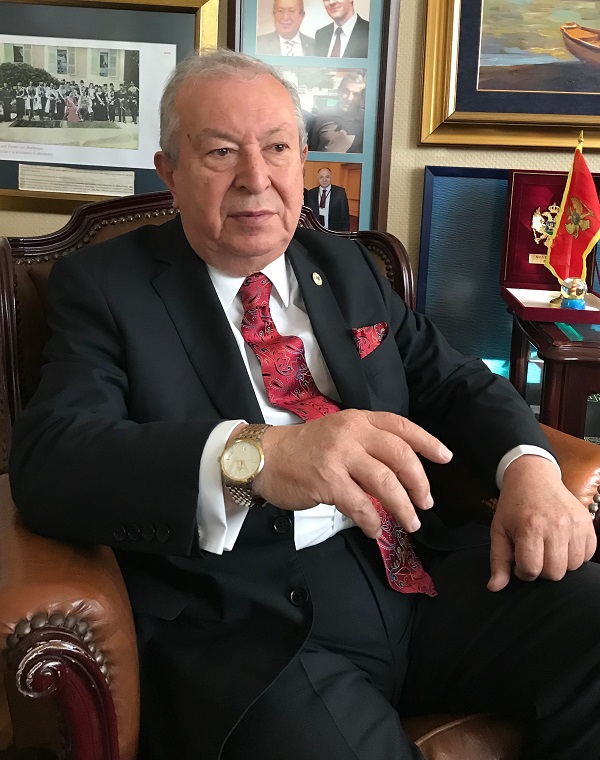The Painful Anniversary of 20 January
Marmara Group Foundation's President Dr. Akkan Suver made the following statement on the occasion of January 20 (20 Janvar-Kara Ocak): "On January 20, Armenia committed a crime, not only against Azerbaijan, not only against the Turkish world, but against all humanity. This human crime was the beginning of the future Karabagh tragedy. We must not forget this day. We are obliged to transfer the knowledge about this crime against mankind from generation to generation. Regarding January 20, we must especially take care of the works that will transmit information to young people."
In connection with this topic, Dr. Akkan Suver has written an article for Milliyet Newspaper which was published on January 19, 2018. Please find the english version of the article below:
Painful Anniversary of 20 January
Dr. Akkan Suver
President of the Marmara Group Foundation
Twenty-eight years have passed since the massive human crime that Armenia committed in Azerbaijan on January 20, 1990.
Known as "Baku Massacre" or "Qara Janvar - Black January", the night is also remembered as "The Night of the Weeping Carnations" because of the carnations that were placed on the blood in the streets of Azerbaijan after this massive and bitter massacre.
During the night of 19 to 20 January, the High Presidency of the Union of the Soviet Socialist Republic under the presidency of Mikhail Gorbachev, stated that "the safety of Armenians and Russians" was "at risk in Azerbaijan" and, on the basis of this excuse, declared a state of emergency. The Red Army, which entered Baku from four separate directions, brutally murdered the defenseless people.
That night, 131 people were killed, 117 of them of Azerbaijani origin, 8 Russian, 3 Jewish and 3 Tatar, and hundreds of Azerbaijanis were arrested when the state of emergency was declared in the country.
After protests increased in Azerbaijan, the Soviet Army finally left Baku.
Henceforth, this incident was called "Black January - Qara Yanvar".
However, the main reason for the incident was related to Armenians. Azerbaijan reacted to the rising demands of the Armenians.
The Soviet administration decided to repress this reactionary period by justifying the Armenians. In a short period of time, 186 thousand Azerbaijani residents were taken from their homes in the Nagorno-Karabakh region and sent to Azerbaijan. This was in fact nothing else than an ethnic cleansing operation.
The aim was to allocate the territory of Karabakh to Armenia and Russia.
January 20, 1990 is the anniversary of a drama for humanity as well as for Azerbaijan.
This drama is the scenario for the preparation of the Nagorno-Karabakh incidents under the auspices of the Soviet Socialist Republics.
That the interventions of the Soviet Union against Hungary in 1956, Czechoslovakia in 1968 and Afghanistan in 1976 found a similar repetition in Azerbaijan, one of the most important republics of its own, is meaningful.
As a matter of fact, after this incident, Nagorno-Karabakh was made unarmed and by ensuring that the Azerbaijan Turks were expelled from the region, the occupation environment of the Armenians was prepared.
Five years later on April 27, 1995, while evaluating the "20th of January" in Istanbul's Çırağan Palace, Mikhail Gorbachev would say: "Declaring a state of emergency in Baku and sending troops there was the biggest mistake of my political life."
But there had been massacres and migrations.
The tragedy of January 20, without really being cursed even today, and the Khojaly Massacre that took place on February 26, 1992 in Nagorno-Karabakh, is nothing more than the continuation of this process.
The crime committed here is a crime against humanity. It is not enough to assume that this crime has only been committed against Azerbaijan, only against Turkishness. This is wrong.
This crime has been committed against all humanity.
While on the anniversary of these bitter events the victims who lost their lives in Azerbaijan are commemorated, the drama identified with the carnations placed in the blood in Azerbaijan's streets is remembered as "The Night of the Weeping Carnations".


